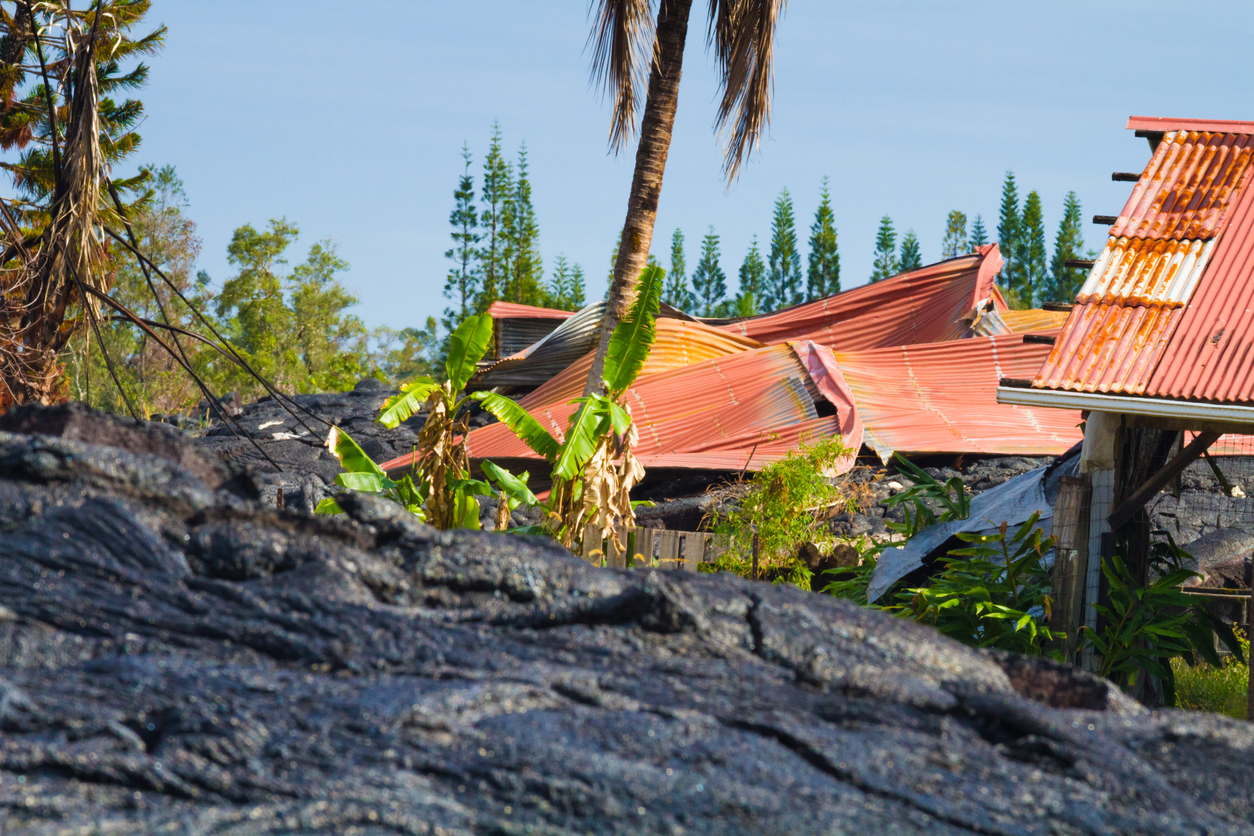Insurance policies usually have some regional factor; exclusions and coverage are tailored to the frequent perils that a homeowner might encounter in that part of the world (say, floods next to a lake or tornadoes in the midwest).
So what about lava insurance in Hawaii? Is there such a thing? In this post, we explore a case study that addresses that very question.
Is There Lava Insurance in Hawaii?
Yes! In addition to private insurers that offer additional endorsements for lava, the Hawaii Property Insurance Association (or HPIA) is an association of authorized insurers (created by the Hawaiian legislature) who issue coverage for perils including fire and volcanic eruption.
The HPIA was established to fill a gap in the insurance market: The legislature noted that the “actual and potential losses caused by the [ongoing] volcanic activity [on the Big Island in particular] has also resulted in the unavailability of basic property insurance for persons having insurable interests in properties in the vicinity which has caused great personal suffering and financial hardship.”1
In other words, volcanic activity had made some properties on the island effectively uninsurable in the existing market, so the Hawaii legislature determined that the HPIA was needed to “provide appropriately priced basic property insurance for owners and occupants of property in high-risk areas for major natural disasters.”2
Does Standard Homeowners Insurance Cover Lava Damage in Hawaii?
As with many insurance questions, the answer depends on the language of your specific policy. This question was addressed in 2020 in a class action suit filed by property owners on the Big Island who found themselves being denied coverage by their insurers following a disastrous loss. At issue, among other things, was whether or not the homeowners (the Plaintiffs) could have reasonably expected their insurance company to disclose that the policies purchased explicitly contained a lava exclusion, despite the fact that:
Plaintiffs allegedly sought homeowner’s insurance that would include lava coverage, given the nature of the location of their homes. Plaintiffs allege that they relied on Defendants’ ‘knowledge, experience, and expertise regarding the appropriateness and availability of coverages in the Hawaii insurance market,’ and that Defendants ‘knew and understood’ that Plaintiffs’ homes were located in high-risk lava zones — making coverage for damages caused by lava flow necessary — yet still sold them policies containing the Lava Exclusion. . . .
Defendants, according to the Amended Complaint, knew or should have known that Plaintiffs lived in high-risk areas, yet they still failed to advise Plaintiffs that they would have qualified for more comprehensive coverage (including volcanic eruption) through other channels.3
The Plaintiffs further allege that the insurance brokers represented their policies containing the lava exclusions as being the only ones available (despite having knowledge of the Hawaii Property Insurance Association, which provides homeowners insurance that doesn’t exclude damage from lava). The Plaintiffs claimed that because the insurance companies regularly sell insurance in Hawaii, they should know about unique risks like volcanic eruptions, as well as the existence of the HPIA and availability of insurance policies that would cover lava damage.
Can You Get Insurance in Lava Zone 1?
Yes, insurance in Lava Zone 1 can be purchased through the HPIA. There are nine lava zones in Hawaii; the higher the number of the zone, the lower the risk. There are currently very few private insurers that sell insurance for property located in Lava Zone 1 because of the high risk.
Should I Get Earthquake Insurance in Hawaii?
Many homeowners policies in Hawaii contain an earthquake exclusion in addition to a lava exclusion. While earthquakes on their own are rare in Hawaii, volcanic eruptions often have associated seismic activity that can also damage your home. Earthquake insurance provides another level of protection against natural disasters common to the region. As always, make sure to consult with your insurance company and/or insurance agent to ensure that your specific policy contains the correct language. And if you feel that your insurance company is operating in bad faith, we can help.
Further Resources on Insurance Coverage Law
Navigating the complexities of insurance claims can feel overwhelming. Whether you’re facing unpaid claims or simply filing for the first time, our eBooks equip you with the crucial information you need to advocate for yourself with confidence.
- Filing A Property Insurance Claim
- Insurance Company Response Time
- What To Do When You Have a Denied/Underpaid Claim
- Wildfire Claims
- Flood Claims Handbook
- More Information on Hurricane Deductible and Policy Limits
- Condominium Hurricane Preparedness
Why Merlin?
Are you fighting an insurance company that won’t pay up on claims? With nearly 40 years of practice and $2 billion in recovered claims, our team stands by your side to ensure you can face any insurance challenge with confidence. Contact us today for a consultation, or read more about how we’re your trusted advocate.
–
1Aquilina v. Certain Underwriters a Lloyd’s, 465 F. Supp. 3d 1088, 1095 (D. Haw. 2020).
2Id.
3Id. at 1094.




